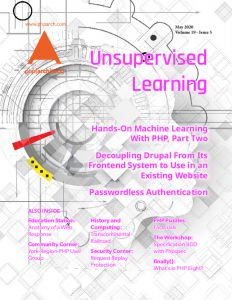Last month, we looked at how we can take our data and, using machine learning, categorize the data by groupings we’d already decided upon—spam, ham, fraudulent, good, etc. This usage is a great way to start, but you might quickly find you want to take things further. Perhaps this means analyzing the data differently, to come up with new relationships you hadn’t previously considered, or maybe you want to improve the accuracy of your results by avoiding some common pitfalls in machine learning. These are the questions we are addressing today, starting with a different approach to machine learning—unsupervised learning.
The ability to create and publish content in real-time without knowing HTML or the ability to program is a common feature of many websites. This capability allows individuals to produce web content regardless of their technical ability. Producing web content is a common feature of many content management systems (CMS). Some websites don’t allow direct creation and publication of content, so a possible solution to address this shortcoming is integrating a CMS into these websites. This article describes how Drupal, a CMS, was added to an existing Symfony website to allow users to publish content in real-time. Implementation details about integrating Drupal into the existing website using Headless Drupal are shared.
Passwords are part of our everyday life. You may not even think about them most of the time, that is until you forget one. What if you never had to use a password again? What if I told you it was more secure not to have a password? Would you believe me? Find out why companies are ditching passwords and moving towards multi-factor authentication.
Each installment of PHP Puzzles presents a small coding exercise typical of those we might encounter in a job interview, or on a coding challenge website. In the following month, we’ll look at a couple of possible solutions for today’s puzzle. Perhaps one of the most common coding puzzles, I recall this one from high school computer class&msdash;calculating a factorial.
Last month, we looked at HTTP requests and how a user agent asks for a specific resource. How do we provide an answer? Web servers send it back in an HTTP response. Let’s look at the parts of a response, how to indicate success or failure, and how to build the response body.
phpspec is a package which allows us to use Behavior-Driven Development, BDD, which comes from Test-Driven Development, TDD. When applying BDD, we write our tests first and then only enough code to pass our tests and then refactor and verify the tests still pass exactly as we would with TDD. This cycle continues and is often referred to as red-green development of writing tests that fail and enough code to make them pass, then restarting the process.
We’re looking at the background behind the U.S. Department of Justice plan to consider antitrust action against the giants of high tech. We’ll see how ocean transportation gave way to transcontinental transportation. That’s the background we’ll need for seeing how transcontinental transportation became the antitrust action that’s setting a precedent for big tech.
One of the most overused terms of security is “token.” It’s used in many different, often unrelated contexts to mean very different things. This month we’re going to discuss one form of tokens—replay prevention nonces—and how to use them.
This month, we revisit our Canadian friends, this time we travel north of Toronto, Canada, to the York Region of Canada and the You Region PHP User Group.
While much of the world shuts down, the PHP core developers have been hard at work preparing for the release of PHP 8.0 at the end of this year! The feature freeze is in just a few months (July 28th), so this is the exciting time when there is a push to get various features into this momentous release! Let’s take a look at a few of the bigger things currently planned for PHP 8.0.




Leave a comment
Use the form below to leave a comment: